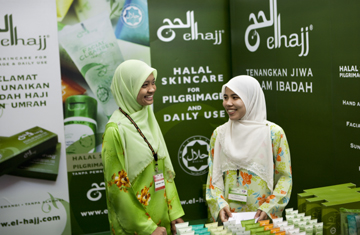
FRESH LOOK: Malaysia-based El Hajj markets skincare products such as moisturizer and facial cleanser to pilgrims headed to Mecca
(3 of 3)
It's Not Just Business
The rising concerns of consumers like Razak herald not just a global economic trend, but a cultural one. During the 1980s and '90s, many Muslims in Egypt, Jordan and other Middle Eastern countries expressed their religious principles by voting Islamic. Today, a growing number are doing so by buying Islamic, connecting to their Muslim roots by what they eat, wear and play on their iPods. Rising Muslim consumerism undermines the specious argument often heard after 9/11: that Muslims hate the Western way of life, with its emphasis on choice and consumerism. The growing Muslim market is a sign of a newly confident Islamic identity — one based not on politics but on personal lifestyles. "Muslims will spend their money more readily on halal food and products than on political causes," says Zahed Amanullah, European managing director of the California-based Zabihah.com, an online guide to the global halal marketplace.
Like many Muslim Americans, Amanullah grew up eating Jewish kosher food in order to conform to Muslim strictures on animal slaughter. But increasingly, there's no need for Muslims to go kosher. Zabihah offers tens of thousands of reviews of halal restaurants, from fried chicken joints in Dallas to pan-Asian restaurants in Singapore. Says Amanullah: "We can't keep up."
The dazzling range of new products and services also reflects the seismic social changes under way in the Muslim world. One of the reasons why halal frozen food, lunch-box treats and quick-fix dinners are growing in popularity is that many more Muslim women, from Egypt to Malaysia, have full-time jobs.
Western Muslims, whose minority status sharpens their sense of identity, are also helping refine the notion of a Muslim lifestyle. In Britain, advertisers are increasingly embracing the power of the "green" pound (that's Islamic green, not environmental green), says Sarah Joseph, editor of Emel, a glossy lifestyle monthly for British Muslims. When Emel launched in 2003, the notion of a Muslim lifestyle barely existed. "People were confused that we could present everything from food, fashion, travel and gardening, all from a Muslim perspective," says Joseph. But Muslims are the fastest-growing segment of the middle class in Britain; they have big families — an average of 3.4 children against the national average of 1.9 — so they buy big cars; they spend money on home decoration and twice-yearly vacations — "not just going back to Pakistan or Bangladesh, like their [immigrant] parents did," says Joseph. Bucking the current publishing trend, Emel is hiring extra staff and planning new magazines to cater to Muslim readers. Advertisers include British Airways and banking giant HSBC.
To keep growing, halal firms know they can't simply rely on religion. "Ideology does not fit within a consumer mindset," observes Amanullah of Zabihah.com. "At the end of the day, people will not buy halal simply because it's halal. They're going to buy quality food. Ideology doesn't make a better-tasting burger, a better car, or a better computer." But it sure makes a powerful marketing pitch.
With reporting by Shadiah Abdullah / Dubai
By the numbers ...
16% — Halal's share of global food industry
$632 billion— Annual halal food market
1.6 billion— Worldwide Muslim population
A Halal Shopping Cart
From fast food to fashion, the sector is thriving
Food
Non-Muslim multi-nationals such as KFC and Nestlé dominate the halal food market. But Muslim-
owned manufacturers such as Dubai-based Al Islami — which sells everything
from chicken burgers to packaged ingredients — are growing fast.
Lifestyle
Muslims — many of them young and increasingly middle-class — are buying more magazines, such as U.K.-based Emel, and halal cosmetics made, like these Saaf products, without alcohol or animal fats, which Islam considers haram, or forbidden.
Services
Hotels run along Islamic lines, such as Dubai's Villa Rotana, offer quieter and more family-friendly places to stay. Banks that operate according to Shari'a law
are doing well during
the global downturn because they tend to be
more conservative.
